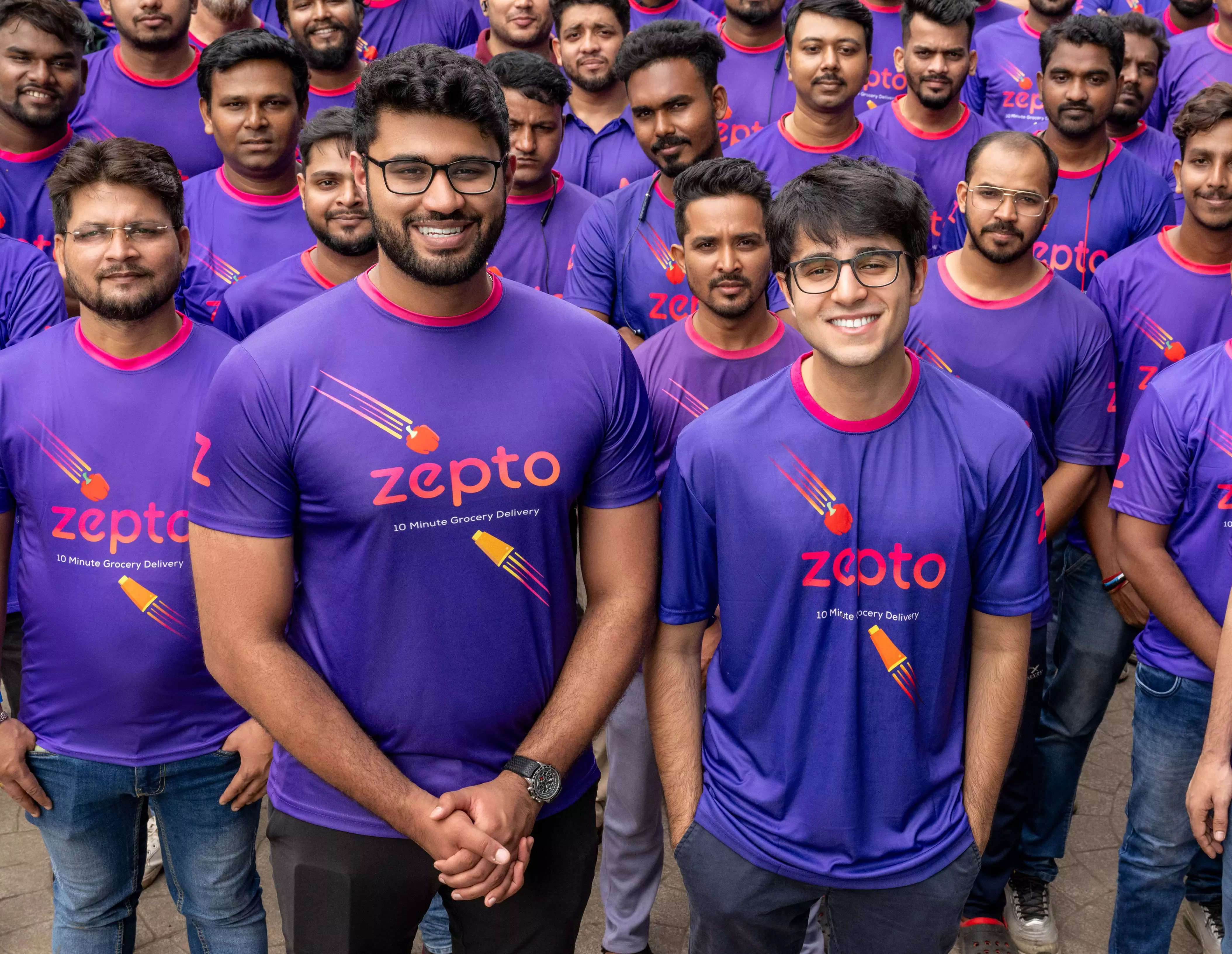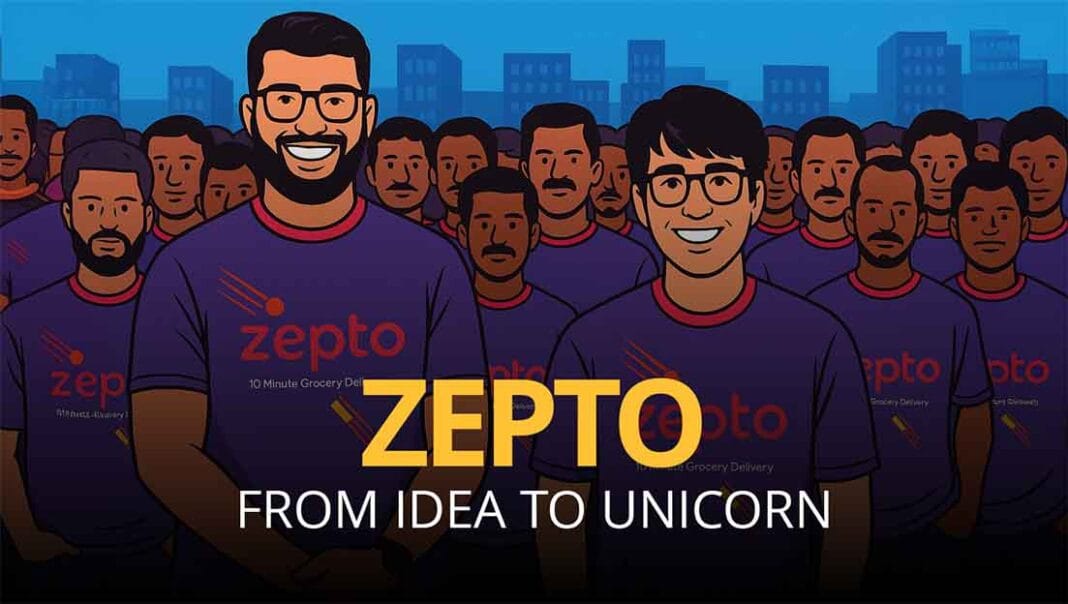How Zepto Perfected the 10-Minute Delivery Model
When the world shut down in 2020, two young Indians turned a lockdown frustration into a billion-dollar revolution. Meet Zepto — the startup that promised groceries at your doorstep in just 10 minutes, and actually delivered.
This is the story of how Aadit Palicha and Kaivalya Vohra, two Stanford dropouts, built Zepto from scratch, disrupted India’s grocery market, and joined the coveted unicorn club — all before they turned 25.
Also read: Garuda Aerospace: From Dorm Room Dream to India’s Drone Powerhouse

The Idea Was Born in Lockdown
In early 2020, Aadit and Kaivalya were under lockdown in Mumbai, attending Stanford classes remotely. Like millions of Indians, they struggled with delayed grocery deliveries.
What started as an everyday problem sparked a bold question: Why does getting milk, bread, or veggies take hours — or days?
The duo wondered — what if groceries could reach people in minutes instead? With India’s urban population rapidly growing and smartphones in every pocket, the timing felt right.
So they packed up their remote Stanford journey and came home — determined to turn that frustration into a business.
Also read: Rapido Food Delivery: 7 Bold Moves Behind Its Zero-Commission ‘Ownly’ Launch
/indianstartupnews/media/media_files/XcZ2RW7srPtRFDnAx04w.jpg)
Early Days: From Trials to the First Order
The first version of Zepto wasn’t perfect. It was scrappy, manual, and far from the slick app millions use today.
In the beginning, they relied on WhatsApp groups and a small army of delivery riders to test hyperlocal grocery drops in select Mumbai neighborhoods.
The early experiments taught them the real challenge: India’s cities are crowded, traffic is chaotic, and meeting a 10-minute promise was ambitious — if not outright impossible.
But the young founders were relentless. They experimented with local dark stores — small storage hubs stocked with popular essentials, placed strategically close to high-demand areas.
Also read: ActionLabs.ai: 5 Bold Innovations Transforming AI for All
Cracking the 10-Minute Puzzle
The breakthrough was the dark store model. Unlike traditional supermarkets, these micro-warehouses stocked only what local shoppers really needed — and sat within a 1–2 km radius of residential areas.
Orders were picked and packed in under 60 seconds, routed through efficient delivery algorithms, and handed to a fleet of local riders.
The result? A system so well-oiled that groceries showed up at people’s doors in 8–10 minutes — even during peak hours.
Aslo read: ActionLabs.ai: 5 Bold Innovations Transforming AI for All
Winning Investor Confidence
Once they cracked the model, investor interest was inevitable. In 2021, Zepto entered Y Combinator, the world’s best-known startup accelerator, and raised seed funding.
Big-name VCs like Nexus Venture Partners, Glade Brook Capital, and Kaiser Permanente joined in. Within months, Zepto closed funding rounds worth over $200 million — an astonishing feat for founders still too young to rent a car in the US!
By May 2022, Zepto was valued at nearly $900 million. A few strategic expansions later, the company crossed the billion-dollar mark, joining India’s unicorn league in record time.
Also read: Kerala’s People-First Startup Revolution: A Blueprint for Inclusive, Sustainable Innovation
Scaling Up: Metro by Metro
Zepto didn’t rush blindly into every city. The team focused on India’s top urban centers: Mumbai, Bengaluru, Delhi-NCR, Chennai, and Hyderabad — cities where consumer spending power and dense urban layouts made the dark store model profitable.
With each new city, the team fine-tuned their inventory, mapped hyperlocal buying patterns, and expanded delivery fleets.
The goal: make Zepto the go-to app when your fridge runs empty at 11 PM.
Also read: India’s Brain Health Revolution: How Ivory is Making Cognitive Wellness a Daily Habit
Bumps on the Road
Zepto’s journey hasn’t been without speed bumps.
Questions about delivery rider safety came up: does the 10-minute promise encourage rash driving? Zepto says it optimizes routes so riders aren’t pressured to speed.
Profitability is another test. Operating dark stores is capital-intensive. The quick-commerce business demands razor-thin margins — meaning Zepto needs massive order volumes and loyal repeat customers to stay afloat.
Yet, so far, the investors believe the model is solid. The demand for speed and convenience keeps growing in India’s cities, and Zepto sits right at the center of that shift.
Where Zepto Stands Today
Today, Zepto runs hundreds of dark stores, employs thousands of riders and store staff, and serves millions of orders each month.
The startup’s journey is far from over. Founders Aadit and Kaivalya are now exploring new categories — household essentials, snacks, personal care — and even eyeing private labels.
Their mission? Turn Zepto into India’s local hypermarket, accessible with just a tap — anytime, anywhere.
Final Word
Zepto’s story is about solving a real problem, thinking local but acting at scale, and proving that even the world’s toughest traffic can’t stop a bold idea.
As quick-commerce heats up, one thing’s certain — Zepto’s journey is one to watch.
Also read: Zoho’s $1 Billion Journey Without VC: How This Indian SaaS Giant Outpaced Silicon Valley
Want more inspiring startup journeys? Subscribe to TheCourtroom.in for weekly stories on India’s boldest founders and fastest-growing ventures.


